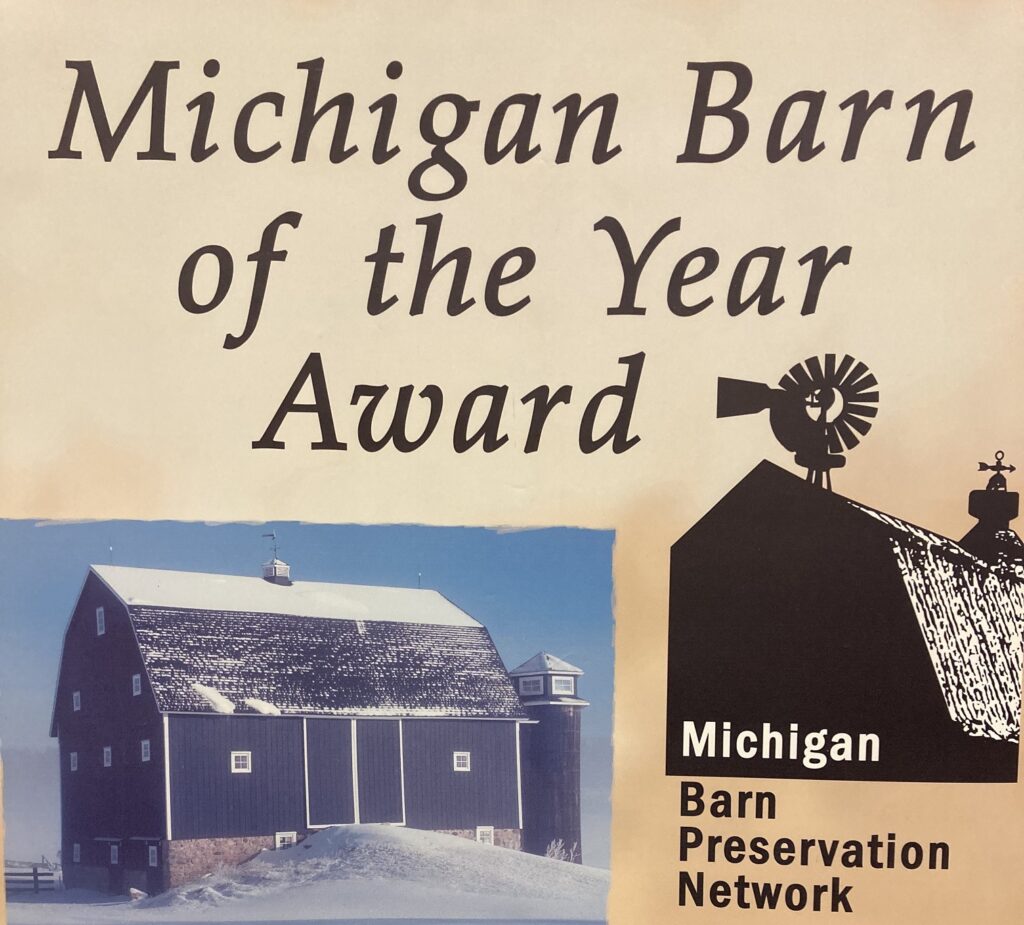
2025 Award Winners
Barn of the Year Continuing Agriculture – Family
Barn of the Year Adaptive Use – Family
Barn of the Year Adaptive Use – Commercial
Barn of the Year Adaptive Use – Non-Profit
The Barn of the Year Program annually honors existing barns that support our ongoing mission to preserve Michigan’s agricultural heritage exemplified by its barns. Presented at the MBPN Annual Conference in mid-March, the awards honor barn owners who have made the extra effort to restore historic barns.
A Coveted Prize…
Since the award program’s inception in 1997, a total of 116 barns have received the Barn of the Year designation. They are recognized for either their unique character, their historic stories, or the heroic efforts toward saving them for future generations to respect and enjoy.
Award categories cover barns that continue to be used for agriculture and those that are adapted for other uses. They are further subdivided into whether the barn is family-owned or the project of a non-profit or commercial entity.
All nominated barns earn Great Michigan Barn status for the owners’ efforts to faithfully rehabilitate and maintain their barn. Some years, the judges also give the Founders Award to deserving individuals.
Here’s How to Enter Your Barn
You are invited to nominate your barn or a neighbor’s for the awards which are presented at the MBPN Annual Conference. To be eligible for consideration, the barn must be in-use, either for continued agricultural purposes or adapted for other uses. Barns must retain their overall appearance — both in their interior and exterior barn characteristics.
Categories
- Continuing Agricultural Use – Family (Private), Non-Profit or Commercial
- Adapted to Other Uses – Family (Private), Non-Profit or Commercial
Evaluation
Nominated barns are judged on (1) completeness of information presented in the application, (2) sensitivity and integrity of repairs or modifications, (3) visual appeal, (4) creativity, (5) thoroughness of work and (6) effort expended to repair and maintain.
Application Components:
Four items are required for the submission:
- A completed application form
- A written narrative
- Photographs (24 maximum)
- Michigan Barn & Farmstead Survey form filled out online
Click here for a sample application form with detailed instructions.
Application materials may be scanned and e-mailed to: klanderson42@gmail.com or via a thumb drive mailed to:
MBPN Barn of Year Committee
11530 Peach Ridge Ave.
Sparta, MI 49345
For questions, contact the program chairman, Keith Anderson. E-mail: klanderson42@gmail.com or Mobile: 616-540-6701.
Nominations are now closed.
There is a three-month window for submitting applications, which generally runs November through January.
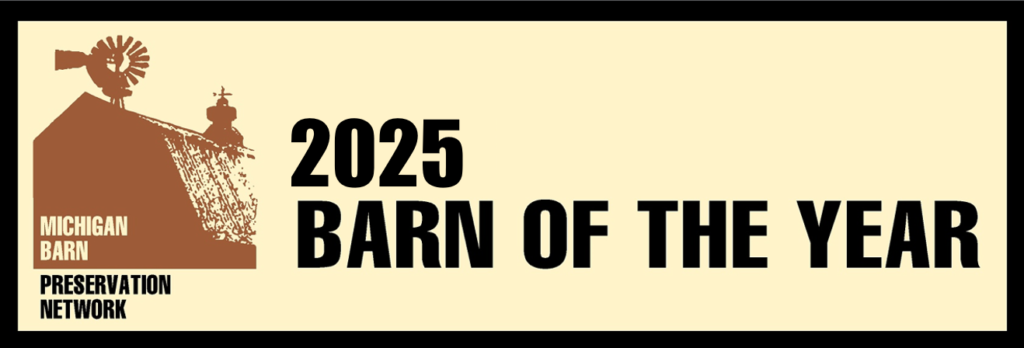
Six barns and their owners were awarded the “Barn of the Year” designation for 2025 at the Michigan Barn Preservation Network’s annual conference on March 15 in St Johns, MI.
Continuing Agriculture – Family
Somerville Barn
Location: Mason, MI (Ingham County)
Owner/Applicant: Bruce & Suzanne Caltrider
Date built: 1881
Use: Since dairy operations ended, agricultural uses have included Shropshire sheep breeding and honey-processing.
Two large barns became one massive barn back in the 1880s, when one was moved and attached to the other end to end. Together, the structure is 90 feet long and has a wing attachment to the back of one of the barns. The massive hand-hewn framing utilized logs with the bark remaining. The end facing the road displays the legend “1881 PJ Somerville.” The property remains in the ownership of descendants of the Somervilles who purchased it in 1863.
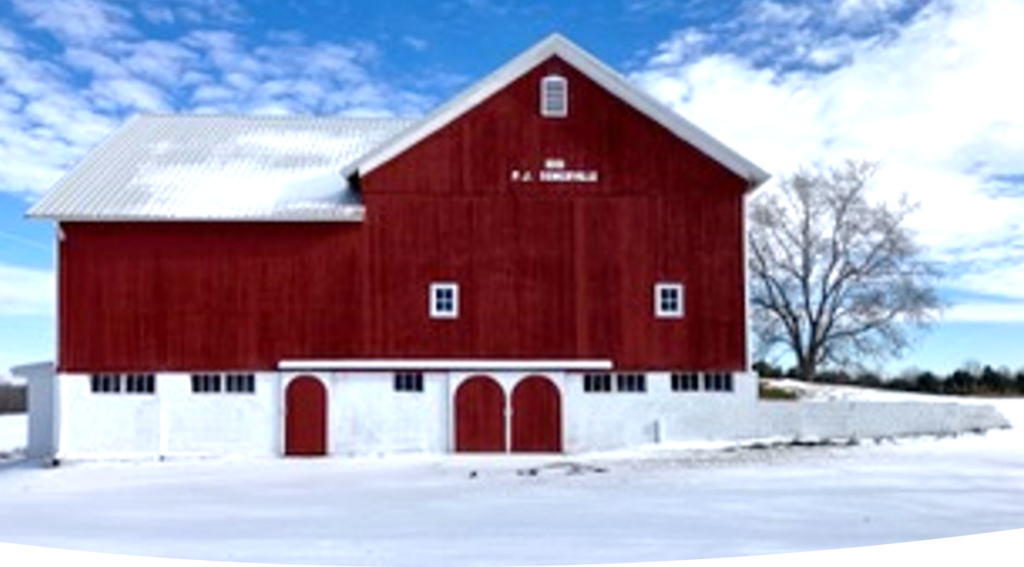
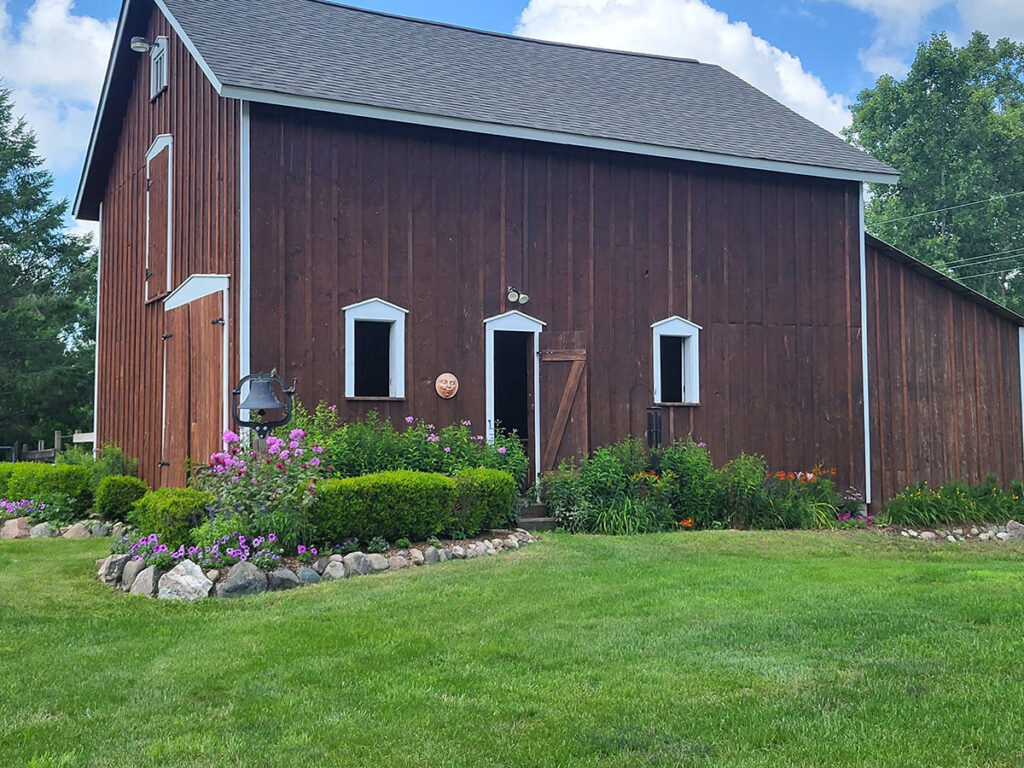
Kucharek Barn
Location: Howell, MI (Livingston County)
Owner/Applicant: Leah & Steve Kucharek
Date built: Late 1800s
Use: Shelter for Leah’s two horses, storage for hay and home to several barn kittens
A previous owner relocated the barn 40 years ago by rolling it, on logs, away from the road to where it sits today. The current owners have been there for 20 years, but only two years ago did they begin fixing up the barn by removing old paint and rough weathered wood, replacing the batten, repairing windows and painting the exterior with 18 gallons of dark walnut stain. According to the owners, “the restoration process took 2 summers, 3 grinders, 7 stitches in a finger, and a lot of sweat and swearing.”
Adaptive Use – Family
Merle Green Family Barns
Location: Green Meadow Farms in Elsie, MI (Clinton County)
Owner: Charles Green
Applicant: Emily (Green) Klingbeil
Date Built: 1940s
Use: Original dairy barns now used for family and community events
Green Meadow Farms, which currently is milking 3,000 cows and farming about 6,000 acres in Elsie MI, was founded by dairy industry pioneer Merle H. Green in 1922. In preparation for the farm’s centennial in 2022, the family rehabilitated two 1940s vintage barns that have stood empty since their use for dairy ended in 1998, in favor of other larger, more modern facilities. More than 1,000 people attended the Farm’s Centennial Celebration, which included tours of the two renovated barns, complete with exhibits and displays of the farm’s 100 year history.
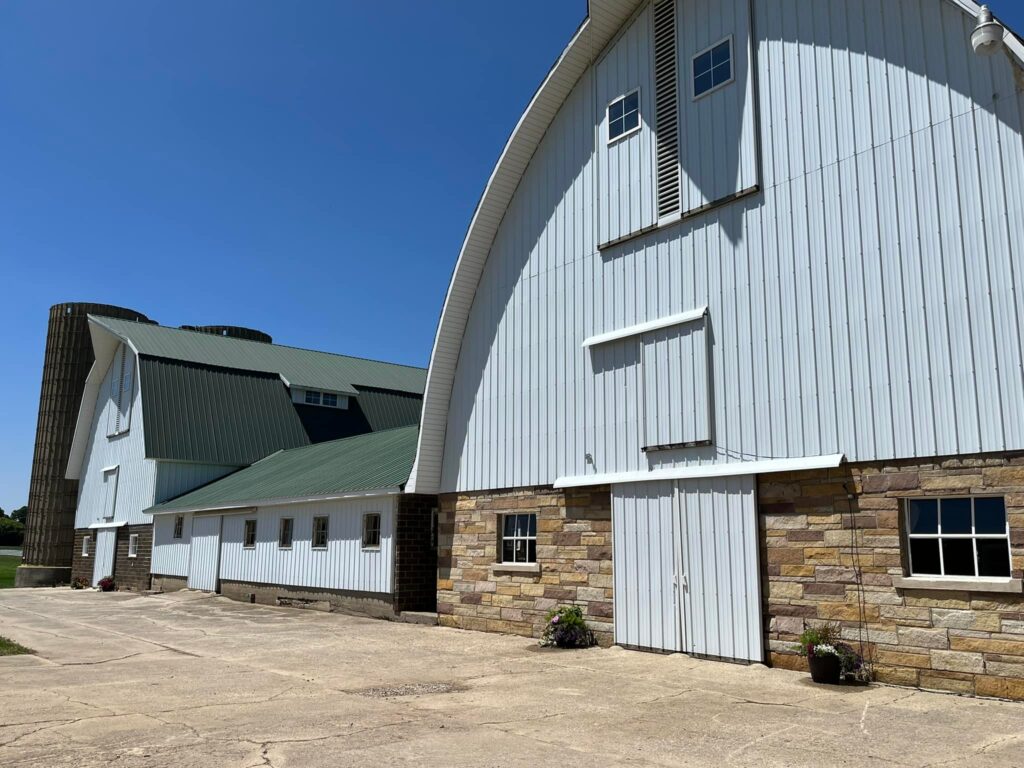
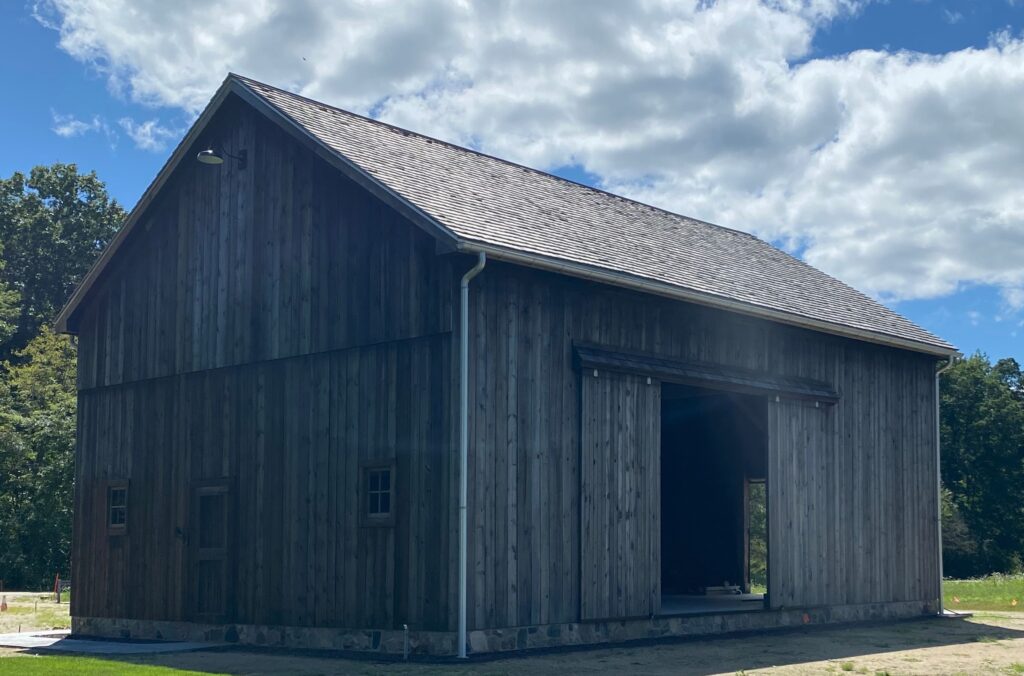
Gasior Barn
Location: Fenton, MI (Livingston County)
Owner/Applicant: Kevin & Karen Gasior
Date Built: 1860s
Use – Commemoration of agricultural heritage; family and community gatherings.
This is the kind of barn that would have been called unsavable and given up on, but the current owners, who acquired the property 9 years ago, spent the last 8 years transforming it. The restoration required jacking up the barn, installing a concrete block foundation, sourcing both new white pine vertical siding, as well as cedar shake roof shingles. Though much is new, the original hand-hewn timber framing and its mortice and tenon joinery is preserved as well as the field stones from the original foundation.
Adaptive Use — Commercial
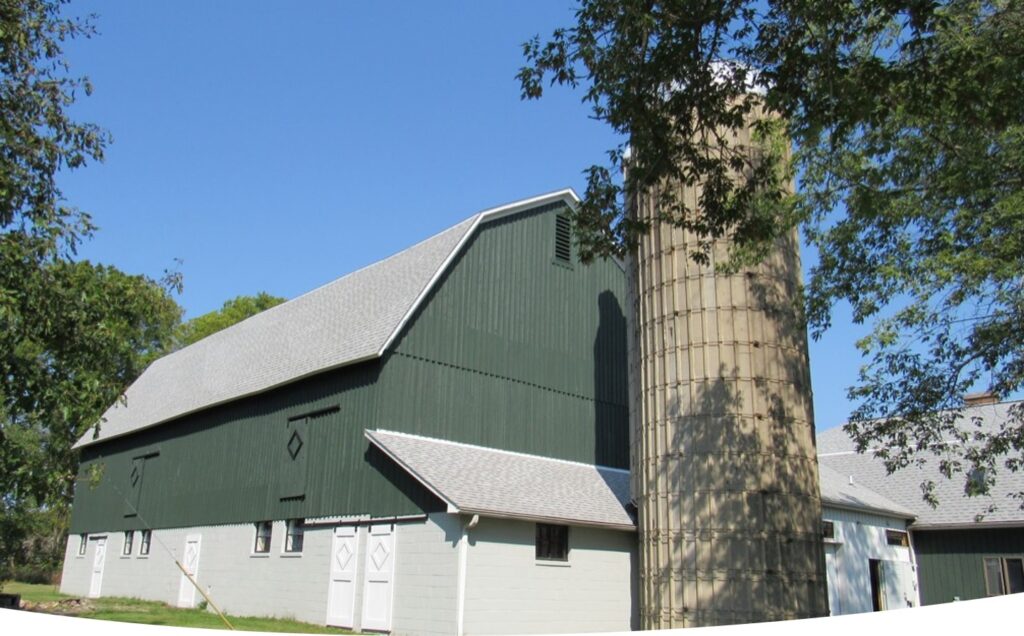
B & B Heartwoods Barn
Location: Ann Arbor, MI (Washtenaw County)
Owners/Applicants: William & Bonnie Geschwender
Date Built: 1944
Use: Business that supplies furniture-grade, kiln-dried hardwoods — rough-swan or dimensioned — for architectural millwork, residential and commercial furnishings and cabinetry.
This 75-foot-long barn with 6 bays, a gambrel roof and attached 50-foot silo was considered “state of the art” when built in the mid-1940s. It still has the hay fork hanging in the peak from when “loose hay” was the norm. In 1998, the owners moved their hardwood business into the barn, continued to make improvements, including the addition of a timber-framed gambrel addition. Recently, the barn, shop and office got new roofs, and a beautiful “forest green” paint job.
Adaptive Use – Non-Profit
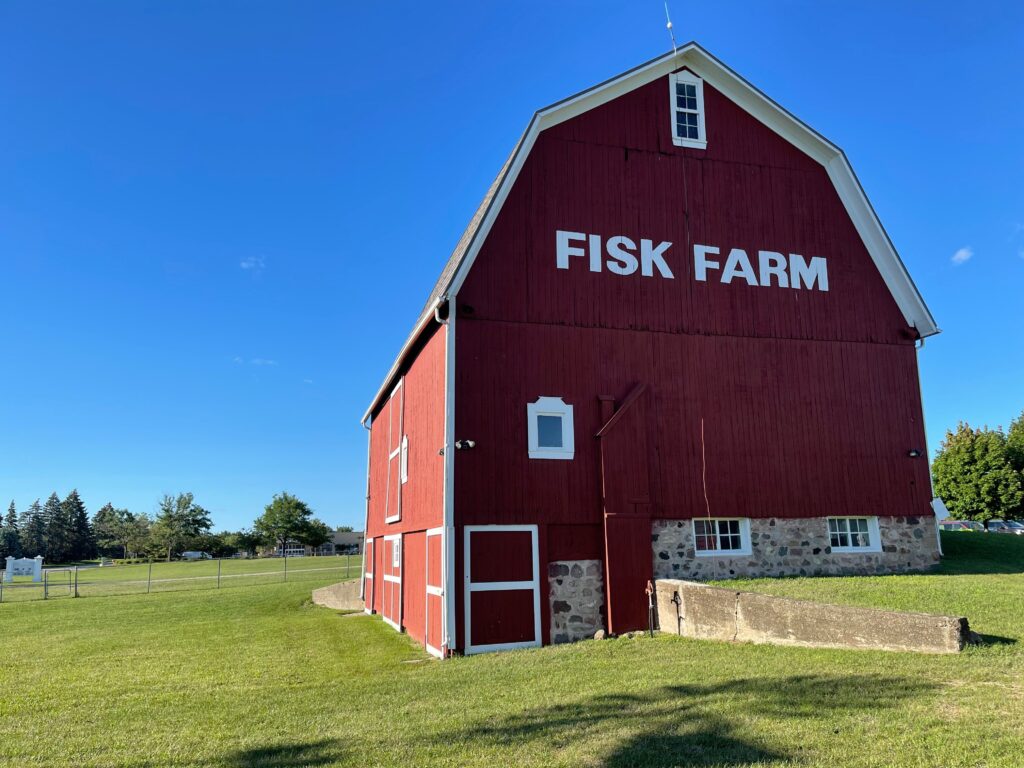
Fisk Farm Barn
Location: White Lake, MI (Oakland County)
Owner: White Lake Historical Society
President: Greg Baroni
Applicant: Barb Allison
Date Built: c. 1900
Use: Part of rural heritage village for public events and student field trips
This fine-looking gambrel, traditional-framed barn’s history as a dairy, hay & grain and horse boarding farm ended in 1979 when the last member of the founding family died. The farm property was purchased by White Lake Township with the intention of demolishing the buildings and perhaps locating a firehouse and township offices there. However, a local resident’s campaign to save the historic farmstead led to the formation of the White Lake Township Historical Society and oversight of the property for community use. Ongoing maintenance by both the original and current owners has kept the structure in good condition.
Founders Award Presented to Two Individuals
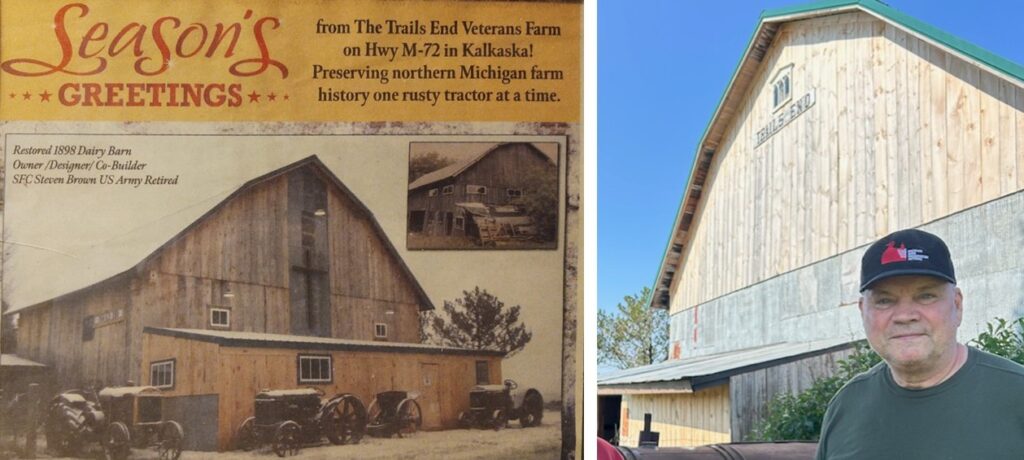
Steven J. Brown
Sgt. Steven J. Brown (ret.) received the Founders Award for his exceptional dedication to barn restoration as a tool for healing. To aid his recovery from combat service in Iraq, he felt a strong need to take on something bigger than himself. Upon his return home in September of 2016, a ‘broken’ soldier and a ‘broken’ barn came together. “One walk around the barn left me with the thought to save it,” he says.
His concept for Trails End Barn embraces the idea that Michigan Farming History should be preserved and displayed for others to see. Not only has he undertaken a massive restoration project, but also has stocked the barn with farming antiques, including some 90 tractors displayed on site. See “90 Tractors” article in a recent edition of MBPN’s quarterly newsletter.

Deron Nelson
Awardee Deron Nelson was recognized for his exceptional preservation of timber-framing techniques in modern barn building. He is skilled in the ‘lost art’ of timber framing and shares his passion to inspire and engage others in traditional agricultural practices.
Like the old-fashioned “barn raising,” when a community would come together to erect a barn without benefit of mechanized cranes or hydraulic lifts, Nelson organized a crew of 70 volunteers to assist with his barn raising in September of 2023—all done by hand.
This most recent project is a 36 x 48 foot saltbox timber frame—5 bents—4 bays. All joinery is traditional mortise and tenon joinery held together, not with nails, but with one inch white oak pegs. The siding is rough-sawn pine with batten strips to finish it off. The crowning touch is a windowed cupola.
Learn about timber framing and see pictures of the hay barn project-in-progress in his slide presentation from the 2025 Annual Conference.
2025 Barn Preservation Honor Roll
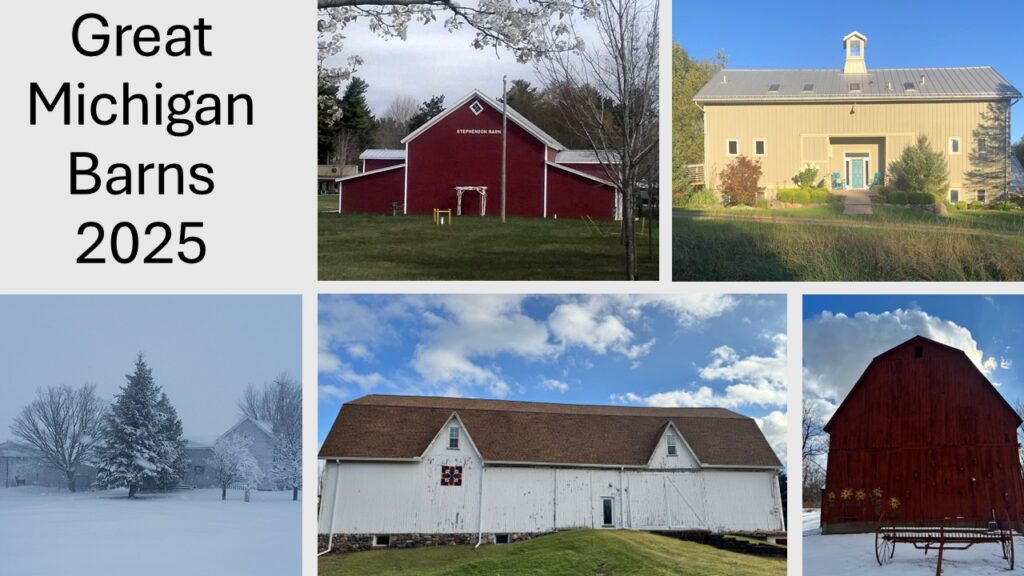
These five barns pictured earned Great Michigan Barn status in 2025, joining the Barn of the Year winners and the barns owned by Founders Awardees Steven Brown and Deron Nelson.
Top Row:
Left – Stephenson Barn, South Haven (Van Buren County); Michigan Flywheelers Museum, applicant
Right – The Barn House, Plainwell (Kalamazoo County; Kathy & Bob Kovacevich, owners / applicant
Bottom Row:
Left – Bell Family Farm, Unionville (Tuscola County); Terri Lynn (Bell) Eden, applicant
Middle: Lessiter Barn, Clarkston (Oakland County); Oliver Beidoun & Alice Sadler, owners/ applicant
Right: Hanish Homestead Barn, Howell (Livingston County); Teresa Hanish, owner/applicant
Past Winners
Click here for database of Barn of the Year winners from 1997 to 2016. Also see showcase of winners in 2017, 2018, 2019, 2020, 2021, 2022, 2023, and 2024.